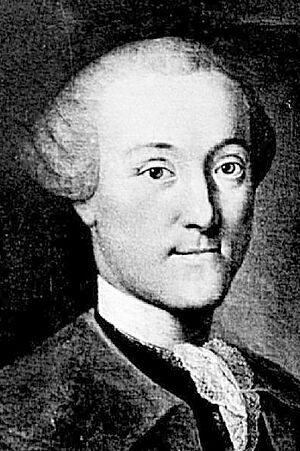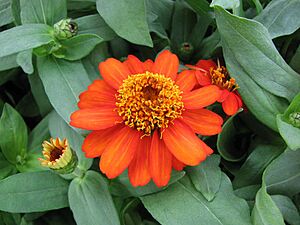Johann Gottfried Zinn facts for kids
Johann Gottfried Zinn (born December 4, 1727 – died April 6, 1759) was a German scientist. He was an expert in anatomy, which is the study of the body's structure, and botany, the study of plants. He was also a member of the important Berlin Academy.
Quick facts for kids
Johann Gottfried Zinn
|
|
|---|---|
 |
|
| Born | December 4, 1727 |
| Died | April 6, 1759 (aged 31) Göttingen, Lower Saxony, Holy Roman Empire (now Germany)
|
| Nationality | German |
| Occupation | Botanist, anatomist |
Contents
Discovering the Human Body and Plants
Zinn's Early Life and Contributions
Johann Gottfried Zinn was born in Schwabach, a town in Germany. Even though he lived a short life, Zinn made big contributions to science. He was especially good at studying anatomy.
A Closer Look at the Eye
Zinn wrote an important book called Descriptio anatomica oculi humani. In this book, he gave the first very detailed description of the human eye. His work helped scientists understand how our eyes are built and how they work.
A Leader in Science
In 1753, Zinn became the director of the Botanic Garden at the University of Göttingen. This was a big responsibility, as he managed many different plants. Just two years later, in 1755, he became a professor in the medical faculty at the same university. This meant he taught future doctors.
Describing New Plants
Zinn also loved studying plants. In 1757, he described a type of orchid flower. This specific group of orchids is called Epipactis. Orchids are a large family of beautiful and diverse flowering plants, known as Orchidaceae.
He passed away in Göttingen in 1759.
Things Named After Zinn
The Beautiful Zinnia Flower
A famous botanist named Carl Linnaeus wanted to honor Zinn's work. So, he named a group of colorful flowers after him. These flowers are called Zinnia and they belong to the Asteraceae family. They originally came from Mexico.
Parts of the Eye Honoring Zinn
Zinn also had parts of the human eye named after him because of his detailed studies. He helped name these parts himself!
- The Zonula ciliaris Zinnii, which is now often called the Zonule of Zinn. This is a ring of fibers that helps hold the lens of your eye in place.
- The Anulus tendineus communis, also known as the Annulus of Zinn (or Circle of Zinn). This is a ring of tissue where some of the muscles that move your eyeball attach.
Zinn's Important Books
Johann Gottfried Zinn wrote several important scientific books during his career:
- A description of the flora around Göttingen (published in 1753). This book described the plants growing near Göttingen.
- Descriptio anatomica oculi humani iconibus illustrata (published in 1765). This was his detailed book about the anatomy of the human eye, which included many illustrations.
 | Sharif Bey |
 | Hale Woodruff |
 | Richmond Barthé |
 | Purvis Young |


